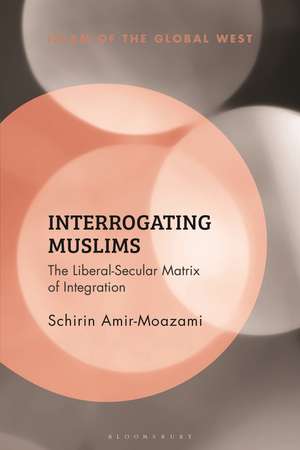Interrogating Muslims: The Liberal-Secular Matrix of Integration: Islam of the Global West
Autor Schirin Amir-Moazamien Limba Engleză Paperback – 21 feb 2024
| Toate formatele și edițiile | Preț | Express |
|---|---|---|
| Paperback (1) | 190.50 lei 6-8 săpt. | |
| Bloomsbury Publishing – 21 feb 2024 | 190.50 lei 6-8 săpt. | |
| Hardback (1) | 538.92 lei 6-8 săpt. | +113.97 lei 6-12 zile |
| Bloomsbury Publishing – 27 iul 2022 | 538.92 lei 6-8 săpt. | +113.97 lei 6-12 zile |
Preț: 190.50 lei
Preț vechi: 248.91 lei
-23% Nou
Puncte Express: 286
Preț estimativ în valută:
36.45€ • 38.06$ • 30.17£
36.45€ • 38.06$ • 30.17£
Carte tipărită la comandă
Livrare economică 04-18 aprilie
Preluare comenzi: 021 569.72.76
Specificații
ISBN-13: 9781350266414
ISBN-10: 1350266418
Pagini: 208
Ilustrații: 5 bw illus
Dimensiuni: 156 x 234 x 25 mm
Greutate: 0.3 kg
Editura: Bloomsbury Publishing
Colecția Bloomsbury Academic
Seria Islam of the Global West
Locul publicării:London, United Kingdom
ISBN-10: 1350266418
Pagini: 208
Ilustrații: 5 bw illus
Dimensiuni: 156 x 234 x 25 mm
Greutate: 0.3 kg
Editura: Bloomsbury Publishing
Colecția Bloomsbury Academic
Seria Islam of the Global West
Locul publicării:London, United Kingdom
Caracteristici
Offers a direct and accessible account of discourses and political practices in the integration of Muslims, exemplified through the case of Germany
Notă biografică
Schirin Amir-Moazami is Professor of Islam in Europe at Freie Universität Berlin, Germany.
Cuprins
AcknowledgementsIntroduction1. Genealogies of Integration and Islampolitik 2. Integration and the emergence of a "Muslim Question"3. Measuring Integration: Governing through Knowledge 4. Dialogue with Muslims: Governing through Recognition 5. Blood, Race, Religion: Governing through Discipline Conclusion References Notes Index
Recenzii
Well-written, perceptive, and un-flinching in its analysis, Schirin Amir-Moazami's Interrogating Muslims is an important and timely intervention into the conversations and contestations around the Muslim Question in Germany. Amir-Moazami shows with rare clarity that we should think of 'integration' less as the incontrovertible good in the contested terrain of majority-minority relations and more as a crucial element in the governance of Muslim minorities-and in the identity formation of the majority. Through the lens of the Muslim Question, what comes into focus here is in fact the question of Germany's liberal identity itself.
Schirin Amir-Moazami carefully studies how the structural interrogation of Muslims by state institutions in Europe forms an intrinsic part of the politics of integration. It does not stem from 9/11 and its aftermath, but has a much longer and more structural genealogy that connects it to the 'liberal-secular matrix,' the politics of recognition, and the colonial mindset. This book provides the fundamental critique of integration in relation to Muslims in Europe that we needed.
By tracing the connections between the current political occupation with the integration of Muslims and the longer trajectories of nation-state building and European colonial projects, this book provides an important and refreshing contribution to the literature on integration and its discontent.
Schirin Amir-Moazami carefully studies how the structural interrogation of Muslims by state institutions in Europe forms an intrinsic part of the politics of integration. It does not stem from 9/11 and its aftermath, but has a much longer and more structural genealogy that connects it to the 'liberal-secular matrix,' the politics of recognition, and the colonial mindset. This book provides the fundamental critique of integration in relation to Muslims in Europe that we needed.
By tracing the connections between the current political occupation with the integration of Muslims and the longer trajectories of nation-state building and European colonial projects, this book provides an important and refreshing contribution to the literature on integration and its discontent.













